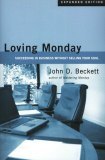Making Money: When You Make a Lot of Money
Blog / Produced by The High Calling
I was having lunch with a friend. We had met at church, and discovered we not only worked for the same company, we also worked in buildings across the street from each other. We had previously met for lunch, arranging to meet at the entrance of the company cafeteria. This time he was coming from a meeting, so I told him to pick me up at my office on the way and then we’d head to the cafeteria together.
When he arrived and knocked at the open door, his entire expression changed. I asked if something was wrong, and he shook his head. We walked down to the cafeteria, with me doing most of the talking. He acted and spoke with reserve, and he seemed troubled by something.
As we ate, he finally said, “You’re a grade 41.”
Surprised he would know, I nodded.
“Your office,” he said. “It’s the office for a 41.” Until that moment, I had known there were grades, but I didn’t know that offices also contained their own hierarchal code.
“Stock options,” he said. “Executive bonus.” I nodded again.
We were the same age. I was in Corporate Public Relations. He was in Finance. We had started the company about the same time, he at a manufacturing facility in the South and I at corporate headquarters.
“I work in a cubicle,” he said. “Grade 38.”
“Is this important?” I asked, and he shrugged.
That short exchange told me I was in a different corporate class. I had advantages. I had access to upper management. I was the CEO’s speechwriter. And I was paid well.
My friend was surprised because apparently I didn’t act like he expected a Grade 41 to act.
My wife and I have been blessed financially many times over during the course of our marriage. My first job after college was at a newspaper, for $125 a week—low wages even in 1973 (journalism had a tradition of paying starvation wages). Over the years, we had periods of financial struggle, like the time I wrote a hot check for a $3.25 frozen pizza (although the next day was payday) and the Christmas when the presents were a loving pile of IOUs. And the time when a recession discovered my consulting business, and work dried up.
But we managed. And we saved. Actually, my wife saved. We never felt deprived. We never believed we were owed anything. We worked hard, and saved hard. Education was a priority, and we could afford private schools for our two sons (they both chose to go to a state university). We took vacations, but not every year.
By the standards of the global working class, and by the standards of the American working class, I am paid well, perhaps extremely well. Most of the world would consider us rich. We are, but not in the way the world defines it.
Three principles guide how we use our money.
First, what we have does not belong to us. We’re entrusted with it. Yes, we’re able to enjoy some of it. But ultimately it is not ours to keep or spend. We’re expected to manage it and use it wisely.
The second principle follows the first. We’re blessed, so we distribute the blessing given to us. Our needs are more than provided for, so we in turn provide. This isn’t about income tax deductions; this is about a biblical mandate.
Third, we don’t live extravagantly, but we are able to live well. My wife drives a 13-year-old minivan, and will likely cry when she trades it in. I drive a six-year-old sedan that I love, in spite of the tire that desperately tries to deflate itself. We don’t need new cars every year, and we don’t need fancy nameplates on our cars. We live in a nice neighborhood, but there are neighborhoods nearby with bigger lawns and bigger houses.
When it comes to family finances, we don’t deliberately live lives of conspicuous religious virtue. That would miss the point entirely. We are blessed, and that means much is expected of us.
My friend at work who had difficulty dealing with my grade level stayed my friend. We had more lunches together. We were in a group Bible study together.
In retrospect, I’m glad he was surprised. It would have been awful if he hadn’t been.
______________________________
Making Money
One of the benefits of work is making money. Some people are blessed to receive a lot of money for the work they do. Money is often considered a taboo topic, but in this series, Making Money, we invite you to join us in lifting the veil and bringing the topic into the open. Ask questions, right along with us. Let's consider how to live in the world as people of faith who desire to do good work, and to be good stewards of our resources.











